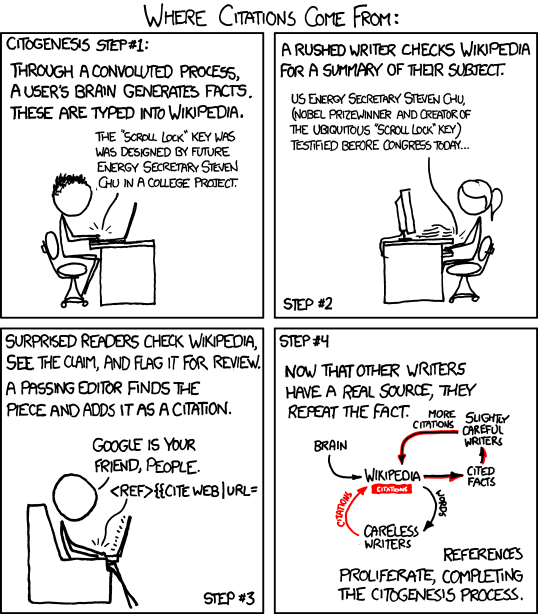Wikipedia
The English Wikipedia is one of the world's largest online encyclopedia and a top-ten most popular website in the West.[1] The website is a process of outside non-active users writing most of the content of 5 million articles, and about 1,200 people who almost all know each other, doing most of the non-bot edits, or editorializing and mistake-fixing.[2]
Meme cops[edit | edit source]
In the context of being deletionist, Wikipedia is the world's third most influential non-state editorial board (oligarchic thought police), not a democracy[3] or "wisdom-of-the-massses" or "swarm intelligence" effort.
Wikipedia has used babe.net as a reputable source, but will generally not allow A Voice for Men as a reputable source.
Controversies[edit | edit source]
Love-shy, incels, GamerGate[edit | edit source]
The love-shyness article existed for a long time on English Wikipedia but was deleted after two AfD nominations.[4] "Love-shy" now redirects to "incel". The current iteration of the English Wikipedia incel article was created in 2018 by GorillaWarfare. Her administrator permission allowed her to override the page protection.
In the wake of Gamergate, the English Wikipedia Arbitration Committee imposed "standard discretionary sanctions, which are authorized for all edits about, and all pages related to, (a) GamerGate, (b) any gender-related dispute or controversy, (c) people associated with (a) or (b), all broadly construed."[5]
Biographies[edit | edit source]
One of the biggest controversies since its inception is the disparity on Wikipedia in the number of male and female biographies.
Citogenesis[edit | edit source]
XKCD on 16 November 2011 highlighted perfectly in a 4koma how original research posted on Wikipedia was relied upon by outside sources which were then assumed to be reliable sources and cited by Wikipedia itself.
Non-English Wikipedias[edit | edit source]
In addition to the English Wikipedia, German Wikipedia, French Wikipedia, etc. there also exist wikis such as the Esperanto Wikipedia, Interlingua Wikipedia, Simple English Wikipedia, etc., whose purpose as far as incels and other dissidents are concerned is mainly so they can get politically incorrect work published that would get deleted from the English Wikipedia. The effort required to learn how to edit these Wikipedias effectively is enough to deter the dominant English Wikipedians from following dissidents there, which serves to create a mostly safe haven for the exiled to operate unmolested.
Meanwhile, it is possible for the reader to find these articles via a search engine and use, e.g., Google Translate to read the text. The main downside is that without the English Wikipedia's vast collection of articles, it is not as possible to take advantage of wikilinks to boost SEO.
Criticism[edit | edit source]
Larry Sanger[edit | edit source]
The Co-Founder's Lament
There once was a learnèd philosopher,
Who was hired as Nupedia's first officer,
But over the years,
His hopes turned to fears,
"Expert must never lag amateur!"
But now the co-founder's lament,
Has hardened his heart to cement,
He publishes jeers,
He sees puppeteers,
"It's biased one hundred percent!"[6]
In 2007, Wikipedia's co-founder, Larry Sanger, stated Wikipedia was "broken beyond repair"[7] In 2013, he stated: "Starting http://InfoBitt.com means I am finished with Wikipedia criticism. Quote this back to me if I happen to lapse."[8] In a 2021 interview, he said that he could "no longer trust the website [he] created".[9] It must be noted that all of Sanger's attempts at competing with Wikipedia since he left Wikipedia in 2002—one year after Wikipedia's launch—were utter failures, and that he may hold a particular grudge against Wikipedia.
It must be noted that Sanger's vision of neutrality was expressed in his failed Wikipedia competitor project, Citizendium: to give as much weight to every type of argument in each domain. In practice, it meant giving for example as much weight and article space to climate change proponents than to climate change deniers, to religious fundamentalists than to religious liberals and historical critics, to mainstream science than to various alternative medecines, whether considered proven or unproven.[10] In 2020, Sanger defended this vision once again in an article.[11] By doing so, Sanger may try to bring alt-right affiliated people or "truth seekers" (ie people doubting mainstream views in general) in his current project, the Encyclosphere, but to no avail[citation needed].
See also[edit | edit source]
References[edit | edit source]
- ↑ The Top 10 Most Popular Sites of 2018, Lifewire
- ↑ http://www.aaronsw.com/weblog/whowriteswikipedia
- ↑ https://en.wikipedia.org/wiki/Wikipedia:What_Wikipedia_is_not#Wikipedia_is_not_a_democracy
- ↑ Wikipedia:Articles for deletion/Love-shyness (2nd nomination), Wikipedia
- ↑ Wikipedia:Arbitration/Requests/Case/GamerGate, Wikipedia
- ↑ https://en.wikipedia.org/wiki/Wikipedia:Wikipedia_Signpost/2021-07-25/Humour
- ↑ https://www.itnews.com.au/news/wikipedia-broken-beyond-repair-says-co-founder-78127
- ↑ https://twitter.com/lsanger/status/311920835168436224
- ↑ Wikipedia co-founder: I no longer trust the website I created
- ↑ https://rationalwiki.org/wiki/Citizendium
- ↑ Wikipedia Is Badly Biased


